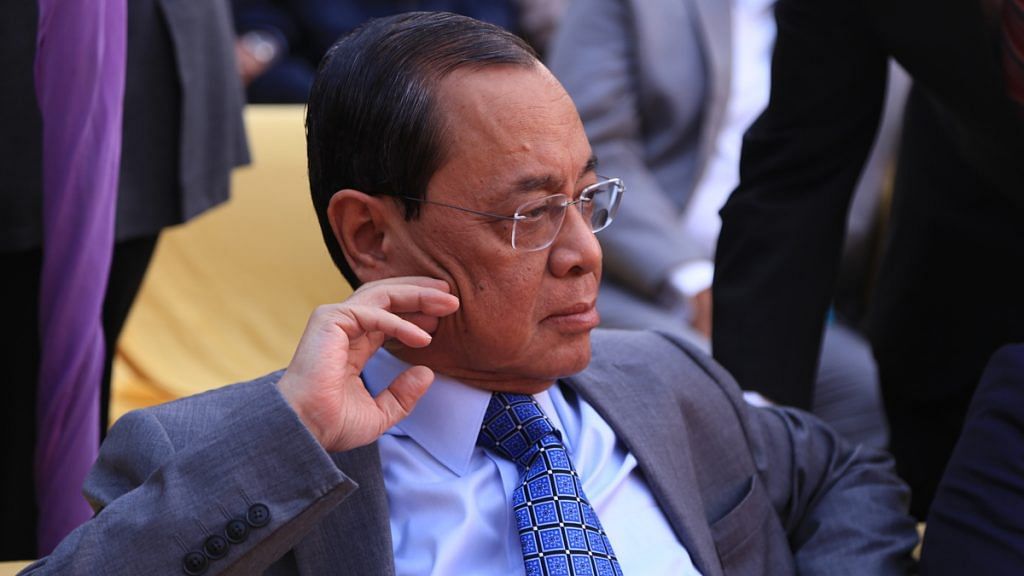New Delhi: Chief Justice of India Ranjan Gogoi met UP Chief Secretary Rajendra Kumar Tiwari and DGP Om Prakash Singh in his chamber at the Supreme Court Friday to discuss arrangements ahead of the Ayodhya verdict, which is expected Saturday. However, the meeting triggered another debate on the judiciary stepping into the executive domain.
A five-judge Constitution bench heard the century-and-a-half-old Ram Janmabhoomi-Babri Masjid title dispute for 40 days before reserving its judgment on 16 October. Gogoi is set to retire on 17 November.
Before CJI’s meeting with the UP officials, there were reports that as many as 30 bomb squads had been deployed in Ayodhya, after an intelligence input about a terror threat. A tight security blanket has been deployed in the city.
However, Gogoi has been criticised for the meeting, with former judges and legal experts saying it was “unprecedented”, and he should have gone through the Ministry of Home Affairs.
Also read: Not Ayodhya verdict, blood trail going unpunished worries me: Umar Khalid
‘Judiciary overstepped its limits’
Justice S.N. Dhingra, former Delhi High Court judge, who handled many high-profile cases against politicians and upheld Parliament attack accused Afzal Guru’s death sentence, said the judiciary overstepped its limits.
“Sometimes judges do ask the executive to take necessary steps, especially when they fear the verdict may have repercussions. But the mode of communication should be with the Ministry of Home Affairs. With the news coming daily, the government is bound to be aware on its own. When they had to hang Afzal Guru, precautions were taken — not by the judiciary but the executive,” Justice Dhingra told ThePrint.
“By doing this (CJI meeting officials), the judiciary overstepped its limits. This is certainly unprecedented,” he said.
Justice Prabhat Chandra Agarwal, former judge of the Madhya Pradesh High Court agreed and added that CJI Gogoi’s meeting ahead of the Ayodhya verdict would create doubts in the minds of people about the verdict.
“I have been a judge for 40 years and if you talk about lower courts, when a judge is about a deliver a crucial verdict, there isn’t even police protection for the judge, forget preparing the state,” Agarwal said.
“This act will create doubts in the minds of the people that the verdict will indeed be troublesome. It is the job of the executive to take care of law and order. The judge should not portray that he is apprehending trouble,” he said.
A former woman judge of the Supreme Court, who wished to remain anonymous, added that “certain intelligence inputs must have necessitated the meeting”.
“Judges never seek extrajudicial information. Law and order is a state subject. Why should the judges be overly concerned? Look at Sabarimala. The judges delivered the verdict. But how can it be implemented or not is the state’s call, not something for the court to take care of,” the former judge said.
“If the judge has to say anything or even take stock of security measures, it must be put through the counsel and lawyers, and anything that the court listens to must be from the lawyers.”
Also read: Beyond religion, there is an intellectual argument for a Ram Mandir at Ayodhya
‘No breach of convention’
However, former Supreme Court judge P.B. Sawant said there was “no breach of convention” in the CJI taking stock of law and order in Ayodhya, but agreed the act was indeed “unprecedented”.
“When the judges expect some trouble, then any institution may have to take necessary precautions, and there is nothing wrong in it. There is no breach of convention here, but I do not remember any occasion when the judge to deliver a verdict had met officials to take stock of law and order,” Justice Sawant said.
“But this matter is very sensitive, and now it is for the police to take steps before any trouble erupts.”
There have already been appeals for peace from Hindu and Muslim organisations, and various political leaders ahead of the verdict. The Union Home Ministry has asked all states to be on alert. Prime Minister Narendra Modi has also reportedly asked his cabinet to ensure there are no unnecessary statements around the verdict.
Also read: Modi govt asks Muslim Ulema to send message of peace through mosques before Ayodhya verdict
